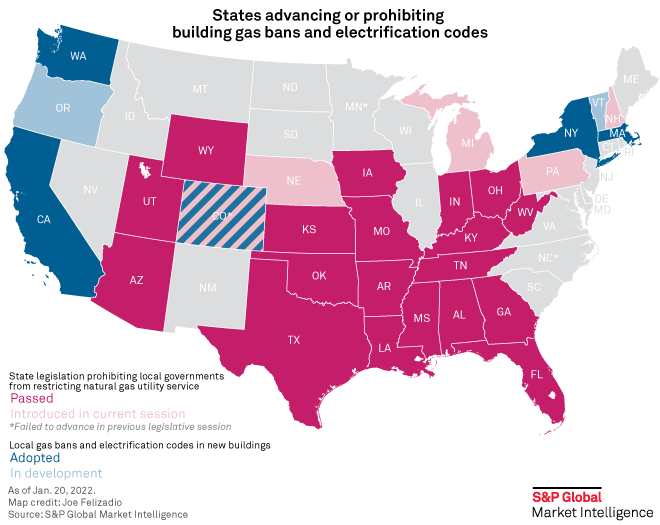S&P Global Offerings
Featured Topics
Featured Products
Events
S&P Global Offerings
Featured Topics
Featured Products
Events
S&P Global Offerings
Featured Topics
Featured Products
Events
Banking & Capital Markets
Economy & Finance
Energy Transition & Sustainability
Technology & Innovation
Podcasts & Newsletters
Banking & Capital Markets
Economy & Finance
Energy Transition & Sustainability
Technology & Innovation
Podcasts & Newsletters
S&P Global Offerings
Featured Topics
Featured Products
Events
7 Apr, 2022

|
People walk along Center Street in downtown Berkeley, Calif. In a 2019 lawsuit, the California Restaurant Association challenged a ban on natural gas in Berkeley that was a model for other U.S. cities. |
Major government and industry players are drawing battle lines in a court challenge to a pioneering building gas ban in Berkeley, Calif.
The U.S. government and a group of liberal-leaning states are among the parties backing Berkeley in the U.S. Court of Appeals for the 9th Circuit. Meanwhile, several industry groups support the California Restaurant Association, or CRA, as it appeals a lower court's decision to dismiss its lawsuit seeking to overturn Berkeley's restrictions on gas use in new buildings.
The Berkeley ban was a model for cities when it passed in 2019, but building electrification mandates have since evolved to meet varying statutory and regulatory frameworks. However, the CRA argument revolved around federal preemption and could be used to challenge electrification codes around the country if the group prevails.

In a 2019 lawsuit, lawyers for the CRA argued that the Berkeley ban ran afoul of the federal Energy Policy and Conservation Act, or EPCA, which regulates the energy efficiency and use of consumer products. The law preempts local and state regulations for EPCA-covered products. Because the Berkeley ordinance essentially required that no gas be used in buildings, it clashed with EPCA jurisdiction over regulating the quantity of gas consumed in appliances, the lawyers said.
In July 2021, U.S. District Court Judge Yvonne Gonzalez Rogers dismissed the CRA interpretation of the EPCA as expansive and unpersuasive. The judge said the Berkeley ordinance did not directly regulate energy efficiency or energy use of EPCA-covered appliances. Instead, Berkeley had relied on authority to regulate local gas infrastructure, an area where Congress has historically and explicitly deferred to states and cities, Gonzalez Rogers said.
In its November 2021 opening brief in the appeals court case, lawyers for the CRA pressed their original argument, saying the district court's conclusion was erroneous. Their argument rested on statutory language that said EPCA rules preempt state and local "regulation concerning ... energy use."
Berkeley draws federal, state support
In an amicus brief in support of Berkeley, the U.S. government essentially concurred with Gonzalez Rogers. The statute, context and longstanding interpretation by U.S. presidential administrations showed that the phrase "regulation concerning ... energy use" only refers to state and local rules that seek to regulate the efficiency and energy consumption of certain appliances, lawyers for the U.S. Justice Department and U.S. Energy Department said.
"Put simply, this provision prevents states and localities from attempting to do at their level what the [Energy] Department does at the federal level," the U.S. attorneys said. "The statute does not preempt the regulation of natural gas distribution, an area traditionally subject to state authority and reserved exclusively to the states by another federal law."
States and municipalities also have the authority to adopt health and safety standards that indirectly affect energy use quantities under the EPCA, the lawyers said.
A group of states and the District of Columbia, several of which have active gas ban movements, said it is incumbent on courts to limit the interpretation of expansive statutory language. The limiting principle in the Berkeley case is that the EPCA does not preempt regulations that are indifferent to the quantity of energy that an appliance consumes, the group said. The states that filed the amicus brief include California, Maryland, Massachusetts, New Jersey, New Mexico, New York, Oregon and Washington.
Industry backs restaurant association's challenge
The American Gas Association challenged a core part of the district court's conclusion. The court found that Berkeley was exercising regulatory authority over gas distribution, which the Natural Gas Act reserved for states and cities. In light of that, the district court said it could not conclude that the EPCA preempted the city's gas ban.
The gas utility group said the authority of state and local entities to regulate gas distribution is not "pervasive and all-encompassing" but limited to specific regulatory goals. For this reason, there is scope for other federal statutes to preempt state and local action related to gas distribution, American Gas Association lawyers said.
In support of the CSA, several industry groups made an argument on the basis of congressional intent. Congress added the preemption provision in 1987 to reduce "regulatory and economic burdens on the appliance manufacturing industry" and to "protect the appliance industry from having to comply with a patchwork of numerous conflicting state requirements," they said.
The industry groups said Berkeley implemented the gas ban without conducting an adequate analysis of the impact on companies that manufacture, sell, install and use gas appliances. The groups that filed the brief were the National Association of Home Builders; National Association of Manufacturers; Air Conditioning, Heating, and Refrigeration Institute; California Building Industry Association; and Hearth, Patio and Barbecue Association.
S&P Global Commodity Insights produces content for distribution on S&P Capital IQ Pro.
